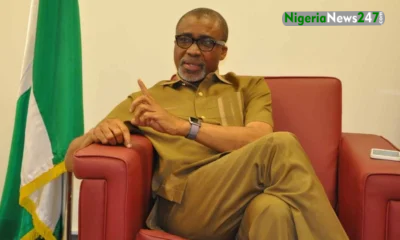NIGERIA NEWS
Senate Reviewed 477 Bills, Passed 25 in One Year – Leader

Over the past year, the Senate introduced approximately 477 bills, of which 25 were passed into law.
The Senate emphasized its commitment through its legislative activities.
Senate leader Opeyemi Bamidele, in a statement on Thursday commemorating the 10th Senate’s first anniversary, highlighted its focus on addressing critical national priorities as mandated by the Constitution.
Bamidele stated, “Since its inauguration on June 13, 2023, the 10th Senate has introduced 477 bills. Of these, 25 have been fully enacted into law, while others are at various stages of the legislative process.”
He acknowledged the seemingly low percentage of fully passed bills — 5.24 percent — but stressed the Senate’s attention to other essential national priorities. In addition to legislative activities, the Senate passed 115 resolutions significant to economic development and national stability. These resolutions originated from motions of national importance, sponsored by various senators after thorough consideration.
Bamidele noted that the number of fully enacted bills is not the sole measure of legislative performance. He explained, “Many people may measure our performance based on the number of bills fully passed into law. Various factors contribute to the low number of fully enacted legislations, primarily due to other highly critical national priorities demanding the Senate’s attention.”
In the past 366 days, the Senate has strategically collaborated with key public institutions, particularly the Executive Arm, to defend the federation’s core interests, ensure macroeconomic stability, promote internal cohesion, and foster unity among Nigeria’s ethnic nationalities. Bamidele added, “We have been utterly committed to positioning our nation for significant regional, sub-regional, and global roles. This commitment is evident in our revised legislative agenda and strategic partnerships with other government branches.”
Apart from the ongoing review of the 1999 Constitution, the Senate initiated diverse processes with a clear and well-defined mandate. Bamidele observed, “Nigeria is now more stable, and the future looks more promising than at any time in our recent history. We are obligated to support our governments, at both national and sub-national levels, in building a resilient economy and equitable federation.”
The Senate has also addressed public concerns, successfully resolving 50 public petitions and screening and confirming 215 nominees for various political offices, including appointments to the Federal Executive Council, Central Bank of Nigeria, and leadership positions in the Armed Forces, Police, and other key agencies. These confirmations were crucial for national development, especially during economic struggles and security threats.





















You must be logged in to post a comment Login